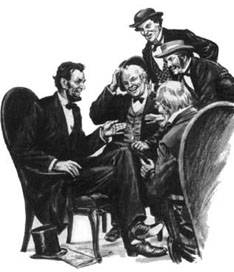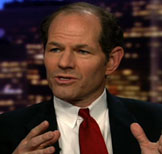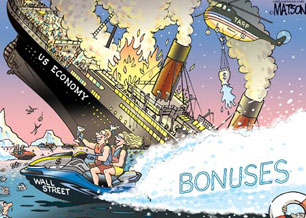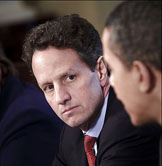Monday, 23 March 2009
 TORONTO, CANADA. Monday, March 23, 2009. At some points in the history of your own time you realize that if you keep taking the mass media seriously you will probably contract some dread disease. (In Canada of course our mass media are so modest that it is sometimes hard work just to find them on your radio dial or TV remote. But that’s another question.) Now that President Barack Obama has been in office just over two months, the US airwaves are suddenly rife with quite absurd things about the generally excellent job he is doing, in the midst of the many challenges of the new Great Recession of 2008–????. To even vaguely imply, e.g., that there are remotely sensible people abroad in the land who are somehow blaming the president for either the AIG bonus payments or the current economic troubles generally — or to imply that President Obama is somehow introducing "Leninism" into American government and politics — is nothing short of hysterically funny, and/or "laughing to keep from crying" at best. And so it was reassuring this past weekend to hear from a real if very rare and exotic US socialist democrat, Mike Davis of California, and a real capitalist democrat, Eliot Spitzer of New York, on PBS and CNN. Democracy in America, apparently, has not gone altogether crazy yet! (And with Canadian oil helping the stock markets soar, Fox Noise is just ... well, they are certifiably crazy, of course — and certainly not any kind of democrats, as everyone already knew.) TORONTO, CANADA. Monday, March 23, 2009. At some points in the history of your own time you realize that if you keep taking the mass media seriously you will probably contract some dread disease. (In Canada of course our mass media are so modest that it is sometimes hard work just to find them on your radio dial or TV remote. But that’s another question.) Now that President Barack Obama has been in office just over two months, the US airwaves are suddenly rife with quite absurd things about the generally excellent job he is doing, in the midst of the many challenges of the new Great Recession of 2008–????. To even vaguely imply, e.g., that there are remotely sensible people abroad in the land who are somehow blaming the president for either the AIG bonus payments or the current economic troubles generally — or to imply that President Obama is somehow introducing "Leninism" into American government and politics — is nothing short of hysterically funny, and/or "laughing to keep from crying" at best. And so it was reassuring this past weekend to hear from a real if very rare and exotic US socialist democrat, Mike Davis of California, and a real capitalist democrat, Eliot Spitzer of New York, on PBS and CNN. Democracy in America, apparently, has not gone altogether crazy yet! (And with Canadian oil helping the stock markets soar, Fox Noise is just ... well, they are certifiably crazy, of course — and certainly not any kind of democrats, as everyone already knew.)
Mike Davis’s socialism as American as apple pie ...
 I have never actually read any books by Mike Davis. I have just bumped into him in reviews and so forth. But based on this slight acquaintance, he has always seemed to me an intriguing writer on urban history and related subjects — someone you would read if you had more time, in a world full of far too many interesting possibilities. And I have remembered his name. So when I saw him on Bill Moyers’ Journal yesterday, I started paying more attention than usual. I have never actually read any books by Mike Davis. I have just bumped into him in reviews and so forth. But based on this slight acquaintance, he has always seemed to me an intriguing writer on urban history and related subjects — someone you would read if you had more time, in a world full of far too many interesting possibilities. And I have remembered his name. So when I saw him on Bill Moyers’ Journal yesterday, I started paying more attention than usual.
Here he was appearing as a rare surviving USA-today socialist — albeit one in a very all-American tradition, redolent of Upton Sinclair’s failed "End Poverty in California (EPIC)" campaign in 1934. As the Moyers’ show’s promotional blurb put it: "Bill Moyers sits down with socialist historian Mike Davis for his critique of the government’s response to the economic crisis and how he thinks it compares to Roosevelt’s New Deal. Mike Davis is a writer and historian, who currently teaches creative writing at University of California, Riverside."
Not being a fan of hallucenogenics, Mike Davis clearly does not think that President Obama and his team are socialists, in the manner of Mike Davis. (They are "liberals" and "progressives," etc.) But as for the question "is Obama FDR?" Mike Davis is "prepared to concede that in terms of his character, his moral beliefs, his empathy and compassion for Americans, but above all in his understanding of the urgency and the unparalleled nature of this situation, yes, I mean, he could be Roosevelt. He could be Lincoln."
 Mike Davis also feels that, so far, what President Obama’s "done most right is to push through the stimulus package, which I argue is primarily a relief bill, because obviously you can't talk about stopping the decline if you're going to allow the public sector, the local public sector, schools and public services on a state and local level to collapse as they are." At the same time Mike Davis feels as well that a bit too often "the President has come to accept that there's only really one way he can operate. And that's through, you know, accommodating himself to the forces that exist and cutting compromises he sees as inevitable. The fact [is] that they may talk about bank nationalization, but it's nothing more than salvaging the banks for the private sector rather than talking about the possibility of public ownership." Mike Davis also feels that, so far, what President Obama’s "done most right is to push through the stimulus package, which I argue is primarily a relief bill, because obviously you can't talk about stopping the decline if you're going to allow the public sector, the local public sector, schools and public services on a state and local level to collapse as they are." At the same time Mike Davis feels as well that a bit too often "the President has come to accept that there's only really one way he can operate. And that's through, you know, accommodating himself to the forces that exist and cutting compromises he sees as inevitable. The fact [is] that they may talk about bank nationalization, but it's nothing more than salvaging the banks for the private sector rather than talking about the possibility of public ownership."
So President Obama, again, is not the "kind of old-school socialist in the way that Billy Graham's an old-school Baptist," as Mike Davis sees himself — to say nothing of the kind of disciple of Lenin insanely claimed by stock market guru Jim Cramer recently, or of Pat Buchanan’s "Socialism pure and simple," or even of what the old Contract with America demoagogue Newt Gingrich has called "the boldest effort to create a European Socialism model that we have seen."
The big political problem in the USA right now, Mike Davis thinks, is that "so many progressives, so many liberals now treat the new President as if he were, you know, El Commandante. And we line up, follow, you know, follow his leadership. But he's maneuvering in a relationship of forces where people on the Left, progressives, even the Black Caucus doesn't account for that much. He's appeasing Blue Dogs. He's having to deal with Republicans." People on the left, Mike Davis thinks, really need to be holding the president’s feet to the fire, not meekly following his lead. And Mr. Davis is a great optimist: "I actually think the American Left is about to receive a huge blood transfusion in the next year or two. It has to because the existence of the Left, the existence of radical social economic critiques, the existence of imagination that goes beyond selfishness and principles of competition is necessary to have any kind of serious debate in this country."
Three cheers to Fareed Zakaria for helping to put Eliot Spitzer back in the public eye ...
 It is not exactly Mike Davis’s socialism that finally makes him so interesting, as best as I can make out on limited acquaintance. Note, e.g., this comment from a fan on a website called BldgBlog: "Mike Davis's particular breed of urban sociology has found many detractors ... who accuse Davis of falsifying his interviews, performing selective research, deliberately amplifying LA's dark side ... and otherwise falling prey to partisan battles in which Davis's classically Marxist approach seems both inadequate and outdated ... these criticisms are all justified in their own ways — yet I still find myself genuinely excited whenever a new book of his hits the bookshop display tables." It is not exactly Mike Davis’s socialism that finally makes him so interesting, as best as I can make out on limited acquaintance. Note, e.g., this comment from a fan on a website called BldgBlog: "Mike Davis's particular breed of urban sociology has found many detractors ... who accuse Davis of falsifying his interviews, performing selective research, deliberately amplifying LA's dark side ... and otherwise falling prey to partisan battles in which Davis's classically Marxist approach seems both inadequate and outdated ... these criticisms are all justified in their own ways — yet I still find myself genuinely excited whenever a new book of his hits the bookshop display tables."
From a related point of view, about an hour or so after I saw Mike Davis on Bill Moyers’ TV show yesterday, I also saw the former New York State Governor Eliot Spitzer on Fareed Zakaria’s current CNN program — in "his first television interview since being forced from office in a prostitution scandal" last year. I was happy to catch this, partly because it added some capitalist balance to Mr. Davis’s socialist remarks, while still, you might say, being on an at least somewhat similar side to Mike Davis and Bill Moyers, etc, etc, with regard to "the urgency and the unparalleled nature" of the new Great Recession of 2008–????.
I was also happy to catch Fareed Zakaria’s interview with Eliot Spitzer, because I have long thought that Mr. Spitzer’s "being forced from office in a prostitution scandal" last year in fact had quite a lot to do with his early efforts to come to grips with the financial troubles on Wall Street, that finally reached cataclysmic proportions this past fall. In fact, just under a year ago now I did a counterweights article that alluded to this broad subject, called "SEX AND POLITICS IN USA .. is it just a plot to cover up truths America still can’t handle?" And I am pleased as well to read on the CNNPolitics website that: "The former governor, a Democrat who led New York from January 2007 until he resigned in March 2008, was hired recently by Slate magazine to write a regular online column."
 None of this, of course, is to suggest that Eliot Spitzer was not involved with a young prostitute apparently called Kristen — or to deny that, as the New York Times reported last spring, he "was always a politician of the most intense, high-strung order, whose ... eruptions seemed particularly ill suited for the role of executive ... Several aides said Mr. Spitzer had begun drinking more than his usual nightly glass of scotch. And his wife, a loyal and reliable support during Mr. Spitzer’s years of unchecked success, appeared to find the role harder to play when each month seemed to bring some fresh setback." As Mr. Spitzer himself told Fareed Zaklaria in the interview which aired yesterday (Sunday, March 22, 2009): "I would say to [critics] that I never held myself out as being anything other than human ... I have flaws as we all do, arguably. I failed in a very important way in my personal life. And I have paid a price for that." None of this, of course, is to suggest that Eliot Spitzer was not involved with a young prostitute apparently called Kristen — or to deny that, as the New York Times reported last spring, he "was always a politician of the most intense, high-strung order, whose ... eruptions seemed particularly ill suited for the role of executive ... Several aides said Mr. Spitzer had begun drinking more than his usual nightly glass of scotch. And his wife, a loyal and reliable support during Mr. Spitzer’s years of unchecked success, appeared to find the role harder to play when each month seemed to bring some fresh setback." As Mr. Spitzer himself told Fareed Zaklaria in the interview which aired yesterday (Sunday, March 22, 2009): "I would say to [critics] that I never held myself out as being anything other than human ... I have flaws as we all do, arguably. I failed in a very important way in my personal life. And I have paid a price for that."
Yet, fortunately I think, Eliot Spitzer’s recent hiring by Slate magazine and his appearance on CNN TV yesterday suggest that the guardians of public opinion in the USA today have now begun to agree or in any event sympathize with the likes of Alan Dershowitz, Greg Palast, and others. It was, or may well have been, that is to say, arrogant political-financial elites that really brought Spitzer down last year, because he was starting to press some public accountability on what we now know very well indeed was an increasingly troubled US financial system. This at least seems a much less deniable speculation than it may have appeared a year ago. And Mr. Spitzer suddenly has interesting things to tell those of us who are not immersed in the New York power structure — the land of the fallen masters of the universe, who have lost their magic but still think they ought to be getting extravagant bonuses even when they screw up!
Here is a brief sample from the CNNPolitics website (and it does suggest that Spitzer remains in some kind of position to help us understand just what is actually going on): "‘Virtually all’ of the $80 billion-plus in the initial AIG bailout went to the company's counterparties, including nearly $13 billion to investment bank Goldman Sachs alone, Spitzer said. ... ‘Why did that happen? What questions were asked? Why did we need to pay 100 cents on the dollar on those transactions if we had to pay anything? ...What would have happened to the financial system had it not been paid? These are the questions that should be pursued’ ... Spitzer looked at AIG's financial practices as [New York State] attorney general, an inquiry that led to the resignation of Maurice ‘Hank’ Greenberg, the insurance giant's longtime chairman, in 2005 ... Spitzer commended Obama for the way the he has handled the economic crisis ... ‘I think one of the largest, most difficult tasks that he has is to control the outrage that is brewing in the public, sympathize with it and garner it, but use it to get good policy, not policy based upon anger.’"
Joseph Schumpeter’s Capitalism, Socialism and Democracy in the spring of 2009 ...
 Very quickly, the current political and economic turmoil in the USA today — that both Mike Davis and Eliot Spitzer were helping elucidate for people like me this past weekend — has also prompted me to look yet again at the celebrated Austrian-American economist Joseph Schumpeter’s classic book of 1942 on Capitalism, Socialism and Democracy. Very quickly, the current political and economic turmoil in the USA today — that both Mike Davis and Eliot Spitzer were helping elucidate for people like me this past weekend — has also prompted me to look yet again at the celebrated Austrian-American economist Joseph Schumpeter’s classic book of 1942 on Capitalism, Socialism and Democracy.
This is a book that has traditionally found supporters in both the old capitalist and socialist camps. Schumpeter himself was a confirmed capitalist. And his theory of "creative destruction" in the evolution of the market economy, and its many technical virtues for economic development, has been touted often enough in such publications as Business Week in the US over the past few decades — ever since Ronald Reagan and Margaret Thatcher revived the 19th century free-market gospel in the late 20th century practical politics of Winston Churchill’s "English-speaking peoples," and ultimately far beyond.
 At the same time, by the early 1940s Schumpeter had come to the strictly analytic conclusion that at least a version of "socialism" was likely enough going to replace "capitalism" in the continuing evolution of the global village. As summarized by a current Australian political theorist on the world wide web, Schumpeter "answers the economists' objection that central planning cannot set rational priorities among the competing possible uses of the factors of production. Schumpeter shows that Socialism could adopt the market as the planning mechanism." And when you spin this argument out, "there is nothing to choose between private enterprise and socialism: a market economy can exist whether the means of production are privately or socially owned. So socialism is as workable economically as capitalism." At the same time, by the early 1940s Schumpeter had come to the strictly analytic conclusion that at least a version of "socialism" was likely enough going to replace "capitalism" in the continuing evolution of the global village. As summarized by a current Australian political theorist on the world wide web, Schumpeter "answers the economists' objection that central planning cannot set rational priorities among the competing possible uses of the factors of production. Schumpeter shows that Socialism could adopt the market as the planning mechanism." And when you spin this argument out, "there is nothing to choose between private enterprise and socialism: a market economy can exist whether the means of production are privately or socially owned. So socialism is as workable economically as capitalism."
This may or may not be the kind of thinking that has suddenly got the likes of Pat Buchanan, Jim Cramer, and Newt Gingrich so upset. But if that is the case, the more all this is actually debated, in the context of the new Obama administration in the USA today, the more it all seems to me like something from a very musty past. The much more likely prospect, I think, is that both "socialism" and "capitalism" are concepts from an era that has ended forever ... "Democracy" is the crucial value that lives on. (Even George W. Bush talked about the need to defend democracy, not capitalism — and of course certainly not socialism — around the world.)
Barack Obama’s new liberal and progressive critics ...
 On a very final related note here, today was the day in US history as well that the Obama administration introduced the so-called details of its continuing bank rescue plan. And at least for today the financial markets responded with a healthy jump ahead. On a very final related note here, today was the day in US history as well that the Obama administration introduced the so-called details of its continuing bank rescue plan. And at least for today the financial markets responded with a healthy jump ahead.
At the same time, both Frank Rich and Paul Krugman in the New York Times — erstwhile strong supporters of the Obama administration — published critical pieces on the president’s current handiwork. It is one thing for the right to be attacking President Obama. What does it mean when the left joins the party?
My own view, for the moment at any rate, is that both Mike Davis and Eliot Spitzer can help us out here. President Obama is doing what Mr. Davis says: "the President has come to accept that there's only really one way he can operate. And that's through, you know, accommodating himself to the forces that exist and cutting compromises he sees as inevitable. The fact [is] that they may talk about bank nationalization, but it's nothing more than salvaging the banks for the private sector rather than talking about the possibility of public ownership." (And now that this is clear at last, at least the financial markets are happy. Though of course who knows how long that will last? Meanwhile, even those on the left who have investments can logically take heart.)
 Similarly, both Frank Rich and Paul Krugman are also doing what Mike Davis says. People on the left, Mr. Davis thinks, really need to be holding the president’s feet to the fire, not meekly following his lead. And, again, Mr. Davis is a great optimist: "I actually think the American Left is about to receive a huge blood transfusion in the next year or two. It has to because the existence of the Left, the existence of radical social economic critiques, the existence of imagination that goes beyond selfishness and principles of competition is necessary to have any kind of serious debate in this country." Similarly, both Frank Rich and Paul Krugman are also doing what Mike Davis says. People on the left, Mr. Davis thinks, really need to be holding the president’s feet to the fire, not meekly following his lead. And, again, Mr. Davis is a great optimist: "I actually think the American Left is about to receive a huge blood transfusion in the next year or two. It has to because the existence of the Left, the existence of radical social economic critiques, the existence of imagination that goes beyond selfishness and principles of competition is necessary to have any kind of serious debate in this country."
So ... what Frank Rich and Paul Krugman are doing is actually quite healthy. It will not change what President Obama is doing now. But it just may help him out, further down the road on his very ambitious agenda.
Meanwhile, President Obama is equally trying hard to do what Eliot Spitzer says, from a so-called capitalist democrat point of view (if you do want to insist on continuing to use all this obsolete political and economic language): "Spitzer commended Obama for the way the he has handled the economic crisis ... ‘I think one of the largest, most difficult tasks that he has is to control the outrage that is brewing in the public, sympathize with it and garner it, but use it to get good policy, not policy based upon anger.’" For the moment, in other words, everyone who is serious and sensible should be pleased. As this first full week of spring 2009 in North America gets under way, there are at least a few signs of hope in the air. Only registered users can write comments.
Please login or register. Powered by AkoComment 1.0 beta 2!
|
